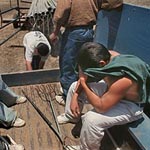The Sacramento Bee
|
Goal is same but programs' methods differ: All give kids chance to succeed By Sam Stanton and Mareva Brown Bee Staff Writers (Published June 29, 1998) CHINO HILLS -- On a serene campus sprawled across 200 acres of Southern California's inland rolling hills, an inner-city gang-banger solemnly presides over a student government meeting. Twenty other chronic lawbreakers sit attentively around a horseshoe-shaped arrangement of tables, evaluating the resumes of a half-dozen other thugs for good citizenship status. Before they came to Boys Republic, all of these youths were entrenched in criminal lives. Now, they have jobs and they worry about such things as character. "The typical social work approach says kids are victims and because they are victims they're not responsible for their behavior. We disagree with that," said Max Scott, executive director of the 93-year-old program. "We feel kids will only grow with the stress of responsibility, so we put as much responsibility on them as we can." It is the trademark approach of the last-chance juvenile delinquency programs that serve California's youth: Children will go straight if they are given a way to succeed and pressure to reform. "If punishment works, let's do it. But it's never worked," said Bob Burton, founder and executive director of VisionQuest, a 26-year-old juvenile rehabilitation program in Arizona where more than 80 California youths were sent last year. "Everybody has the formula, but it's difficult to do." That is why directors of private facilities that house California's delinquent youth disagree when it comes to specifics. VisionQuest, for example, has a number of varied programs in different settings across the country, from a desert tepee camp in southeastern Arizona to a wagon train that covers thousands of miles across several Western states. The idea in all of them is to give youths a chance to accomplish something while staff members teach them how to behave.
But parenting is not a tenet of other programs. Several private juvenile camps, including Rite of Passage in Nevada and the Arizona Boys Ranch, segregate new youths in a tough orientation phase that is designed to break down rebellious behavior, according to probation officers who place youths there. From there, they are graduated to a different camp with more responsibility, more freedom and a lightened physical exercise load. Both of those programs have top-notch athletic programs, which are used to give youths a sense of accomplishment. Glen Mills Schools, in suburban Philadelphia, also uses athletics as a way to enhance self-esteem. But it has another purpose. At Glen Mills, considered by many to be the nation's Cadillac program, peer pressure curbs misbehavior among 1,000 youths as they try to rebuild their lives in brick dormitories that resemble an 800-acre college campus. Newcomers are mixed into dorms and groups with youths who have been in the program longer. The veterans are expected to confront peer misbehavior. "The students will put up with less disrespect than the staff," said Dave Light, a California representative for Glen Mills. "When they lose face in front of their peers, that's what really breaks them down." Staff members prefer boys who have committed their crimes within a group setting -- often gang members of various types. "Our basic philosophy is these are normal kids," Light said. "Aggressiveness is not bad. Some of the best business people in America are aggressive. But it's channeled in a positive way." Boys Republic also tries to get youths to recognize what is appropriate in a "normal" society. There, youths are given much freedom. They are expected to get themselves out of bed and to class on time each morning. They shop for and wear their own clothing. They hold down jobs. And, as frequently as possible, they have a role in deciding their futures. Youths are consulted about their own punishment and release dates. They are expected to be role models for newcomers. "Typically, kids blame everybody else, and while we know these factors enter into it, we don't let them make excuses," said Scott, who has headed the facility for more than 30 years. " 'Your mom may be a drug addict and your dad may be in prison, but that doesn't have anything to do with your stealing a car.' " Older youths are moved into a transitional program that mimics adult living, but provides staff guidance in making key decisions. The idea, said Scott, is that many of these older teens have no homes to return to when they are released from the juvenile system. Excelsior, an Aurora, Colo., program for girls, uses the same type of independent living structure for its older wards. An off-site condominium gives girls the sense of being on their own, but they remain under the vigil of resident staff and must abide by a curfew. Many must use public transit to get to their jobs. At the same time, staff members help girls learn to make a budget, apply for community college and deal with often-rocky family relationships. Younger students are in school between 8:15 p.m. and 4:15 p.m. and hold down campus jobs or learn skills such as manicuring. Yet Excelsior differs from other programs used by California in that it is a therapeutic model. Girls get regular counseling and may be temporarily sent to an on-site locked psychiatric unit. There are nearly as many Californians sent there from mental health departments as from probation departments. Experts say the best way to handle a diverse population of young delinquents is with a wide variety of options.
"There should be 1,000 of these places because there isn't one way to do it, there's 1,000 ways," said Burton of VisionQuest. "The problem is, when you start throwing kids away they come out worse."
|
| ||||||
Copyright © The Sacramento Bee | |||||||
� 1996-8
[email protected]

 Who's guarding the kids?
Who's guarding the kids?

